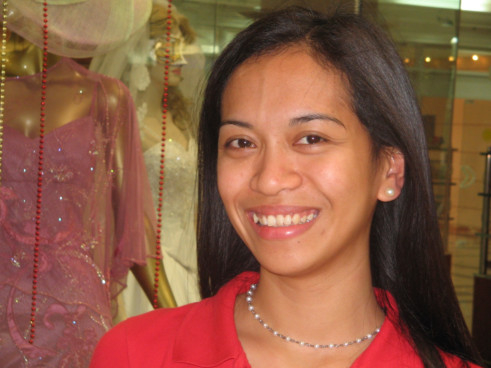
Difference
Families and economies have been transformed
Becoming a mother changes your life completely. When I came to the UAE seven years ago as a single woman, life was very different. I could take at least two hours to get ready in the morning. Today, it takes me fifteen minutes.
I have two children with a third on the way and my mother stays with me and helps me take care of the children. My mother was also working when we were growing up and I can see a lot of changes in motherhood since then.
Today, motherhood has become more expensive and also more demanding. For some reason, the more children grow up the more they know what they want. You cannot just say ‘no’ to them anymore. As a baby, you give them milk change their diaper put them to sleep and that’s it. But now, as they are growing, they know what they want. Like my three-year-old — you cannot argue with her. She knows what she wants.
I think mothers are getting more support nowadays because they are playing a big part in the economy now that more have started working. I’m just waiting for Abu Dhabi to announce the ninety day maternity leave.
But it’s not just motherhood that’s changing, fathers are changing, too. My husband does the dishes if I do the cooking, it’s a tag team and we have to be a team player at home and outside.
From Ms Melanie Poblete
Leasing and property management coordinator living in Abu Dhabi
Gender roles
Changing diapers isn’t just the mum’s job anymore
The meaning of motherhood has undeniably changed over the years. In the past, a mother’s typical day would revolve around her children and household chores. A mother would be expected to be at the beck and call of her husband and children, catering to every little need. I remember being surprised on the days I would return home from school and not find my mother there. However now, the entire definition of motherhood has changed. Mothers no longer have to compromise their wants, dreams and ambitions for their children. It is not uncommon to find working mothers perfecting the balancing act between the difficult demands of their jobs and still finding the time to play an important role in their children’s lives. Home makers, too, believe in taking out time for themselves; be it travelling, going out with friends or finding a new hobby. People understand the importance of ‘me time’ for mothers. The bottom line is if mothers are happy and spending time doing what they love, they won’t experience motherhood as a compromise, but as a choice. The key is to keep yourself happy, because this happiness will reflect on our children.
In the previous generations, men would be the sole decision makers of families. Today, women are more educated and career-oriented. They are involved in all the major decisions of the house, be it financial planning or domestic issues. They are waiting until later in life to get married and have children. Also, the number of children that they would like to have has been significantly reduced.
So they believe that the children’s upbringing is not just a mother’s responsibility. Mothers today expect fathers to play a significant role in the bringing up of their children. It’s not considered a big deal anymore if one sees a father changing a diaper, attending a PTA meeting, cooking and packing a lunchbox or helping their children with homework. Women are ambitious and contributing to the household income, so they expect their husbands to do their share of the work at home, too.
With the changing dynamics of families came changes in the workforce. These days employers recognise the need for longer maternity leaves and flexible working hours for the mothers in their workforce. There are a number of companies which allow women to work from home too. These factors encourage women who want to get back to work after they have had a baby. It’s a far cry from the jobs in the past, where many women could not get back to work after delivery because they didn’t have the flexibility to do so.
From Ms Vidhi Sharma
Part-time tutor at University of Wollongong in Dubai.
Relative
The pace of change varies based on culture
As an Australian teacher and mum working in various countries over 18 years, changes to the the nature of motherhood in contrast to how I was raised — and hence raised my own children — has been quite noticeable. However, we need to take into account various variables including culture when explaining these differences given that beliefs are all relative to the situation.
For example, in some cultures nannies are responsible for raising the child. This is unlike my own culture, where we raised our own children. In contrast, whole families, for example aunts, uncles, and grandparents, besides the child’s own birth parents participate in the upbringing in other cultures.
With today’s fast-paced competitive world, advancing technology, and economic downturns, we also witness changes in the nature of parenthood and families, as a whole. There are various reasons behind this change. Firstly, there are fewer children being born into families. This might occur simply because the family wants greater financial freedom to purchase objects, and to have the opportunity to travel more. I think this is just another aspect of motherhood — giving the child an opportunity to experience things the mum might not have had as a youngster.
The fact that both parents are working today might be a direct result of economic hardship. Children then are left in the care of others, or forced to grow up on their own, which might result in a decrease of family guidelines and values, and, in turn, could affect that child’s schooling and general social skills. In some extreme cases we see as teachers, parents who have little time with their child blame teachers for their child’s low grades and anti-social behaviour.
Job competitiveness can also result in one very overworked mum (or dad). In trying to keep their job, tiredness and worry can contribute to health issues. Job expectations might see the parent reach for things like medication, processed foods and alcohol — all easily accessible in many societies — to keep up. This does not just affect the parent’s overall wellbeing and performance, but invariably affects the quality of time spent with the child.
Is it easier or harder in this day and age for mothers? Again, I think this question is relative to the situation, regardless of how a person was raised. Some mothers will be able to balance their lives depending on their personality types and priorities, whilst others might have a hard time of it. We are all different; mindset and circumstances play a large part in the direction individual motherhood takes and pans out.
From Ms Erica Maxene Dodds
Teacher living in Kaluga, Russia
Time
How guilty you feel depends on your own sense of fulfillment
My mother’s experience was tough but since she was a homemaker, her motherhood was somewhat hectic but without the guilt of not having spent enough time with us.
For me, being a working mother made my motherhood experience extremely challenging because at times it gets difficult to balance work and family. It needs smart time-management skills. Sometimes, being a mother means being present t all school activities in the morning. Therefore, I ask my siblings to participate on my behalf.
I have always worked hard to be a productive employee and an ideal mother who ensures that her children learn the lessons of life quite well, which can help them take certain decisions in their life as they progress.
According to work changes, I have noticed that some mothers complain all the time about not being able to spend valuable time with their children because of their workload, but others do not find it an obstacle because they are satisfied and living their life to its full potential.
In my perspective, a stay-at-home mother who is unhappy about her situation cannot be an ideal mother. On the other hand, many mothers would find satisfaction in staying at home with their children. The most crucial factor in a child’s development and wellbeing is the mother’s sense of fulfillment and the quality of time spent together.
Being a mum today is neither easy nor tough compared to the previous generations. The basic challenge is to be a mother in a world of rapid technological change and increase in workload. I think parents should help children make wise media choices, and should monitor their media diet for both duration and content.
As for workload, if a working mother can ensure that her children are well-loved and cared for, then she should not feel guilty about being at work most of the time. It is the quality of parenting that counts. Women can be good mothers whether they stay at home or work.
From Ms Ayesha Al Janahi
Senior social media specialist in Dubai
Gulf News asked: Have the responsibilities of motherhood become easier in today’s day and age?
Yes 23%
No 77%
— Compiled by Huda Tabrez/Community Web Editor














